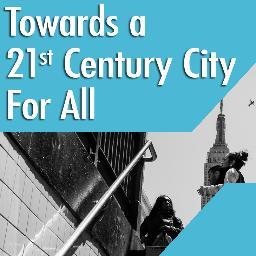Beyond Balance: Forward-Looking Budget Priorities for New York City
July 9, 2013 |
 July 9, 2013. All three of New York City’s citywide elected offices will have new faces in 2014. Mayor Michael Bloomberg cannot run for re-election because of the city’s term limits law, while Public Advocate Bill de Blasio and Comptroller John Liu are both running for Mayor rather than seeking re-election to their current offices. As voters consider a large field of mayoral candidates, as well as contenders for the other two citywide offices, the five borough presidencies and the 51 seats in the City Council, FPI’s Deputy Director and Chief Economist James Parrott has prepared a critical analysis of the budget challenges that loom large for the next city administration.
July 9, 2013. All three of New York City’s citywide elected offices will have new faces in 2014. Mayor Michael Bloomberg cannot run for re-election because of the city’s term limits law, while Public Advocate Bill de Blasio and Comptroller John Liu are both running for Mayor rather than seeking re-election to their current offices. As voters consider a large field of mayoral candidates, as well as contenders for the other two citywide offices, the five borough presidencies and the 51 seats in the City Council, FPI’s Deputy Director and Chief Economist James Parrott has prepared a critical analysis of the budget challenges that loom large for the next city administration.
According to Parrott’s analysis, the city should continue the sound fiscal management practices achieved by the Bloomberg administration, but it should also elevate its critical budget choices and tradeoffs to a more prominent level. Otherwise, he warns, the pressures felt in the context of each year’s budget-balancing exercise will continue to crowd out the pursuit of longer-term priorities. The narrow focus on budget balance often has fostered an austerity mentality where gap-closing actions trump problem-solving. In emphasizing the need for a forward-looking perspective geared to meaningfully addressing city needs, Parrott calls for a multi-pronged strategy that addresses four broad areas that pose particular budget challenges for New York City: the social safety net, economic development, tax structure, and public service delivery.
The full report is available on the website of Toward a 21st Century City for All, an initiative of the Center for Urban Research at the CUNY Graduate Center. Parrott’s paper and other papers prepared for this initiative will be published as a book later this month. A condensed version of Parrott’s ideas on the city budget and the city budget process are available as an Op Ed, “The City Budget Should Be a Force for Good,” which was recently published by The Chief-Leader.
Beyond Balance: Forward-Looking Budget Priorities for New York City
July 9, 2013 |
 July 9, 2013. All three of New York City’s citywide elected offices will have new faces in 2014. Mayor Michael Bloomberg cannot run for re-election because of the city’s term limits law, while Public Advocate Bill de Blasio and Comptroller John Liu are both running for Mayor rather than seeking re-election to their current offices. As voters consider a large field of mayoral candidates, as well as contenders for the other two citywide offices, the five borough presidencies and the 51 seats in the City Council, FPI’s Deputy Director and Chief Economist James Parrott has prepared a critical analysis of the budget challenges that loom large for the next city administration.
July 9, 2013. All three of New York City’s citywide elected offices will have new faces in 2014. Mayor Michael Bloomberg cannot run for re-election because of the city’s term limits law, while Public Advocate Bill de Blasio and Comptroller John Liu are both running for Mayor rather than seeking re-election to their current offices. As voters consider a large field of mayoral candidates, as well as contenders for the other two citywide offices, the five borough presidencies and the 51 seats in the City Council, FPI’s Deputy Director and Chief Economist James Parrott has prepared a critical analysis of the budget challenges that loom large for the next city administration.
According to Parrott’s analysis, the city should continue the sound fiscal management practices achieved by the Bloomberg administration, but it should also elevate its critical budget choices and tradeoffs to a more prominent level. Otherwise, he warns, the pressures felt in the context of each year’s budget-balancing exercise will continue to crowd out the pursuit of longer-term priorities. The narrow focus on budget balance often has fostered an austerity mentality where gap-closing actions trump problem-solving. In emphasizing the need for a forward-looking perspective geared to meaningfully addressing city needs, Parrott calls for a multi-pronged strategy that addresses four broad areas that pose particular budget challenges for New York City: the social safety net, economic development, tax structure, and public service delivery.
The full report is available on the website of Toward a 21st Century City for All, an initiative of the Center for Urban Research at the CUNY Graduate Center. Parrott’s paper and other papers prepared for this initiative will be published as a book later this month. A condensed version of Parrott’s ideas on the city budget and the city budget process are available as an Op Ed, “The City Budget Should Be a Force for Good,” which was recently published by The Chief-Leader.
